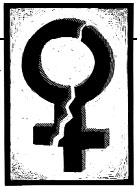Student Perspective
Learning to serve
By Sarahgrace B. Alvarez
One of the most fascinating aspects of medicine is how it represents the convergence of so many different disciplines: science, politics, economics, ethics, sociology. Our patients often find themselves at the epicenter of all these forces. I am very interested in how people's personal lives are impacted by the total medical experience. Despite the rigorous schedule during the first two years of medical school, I have been able to stay focused on this interest by serving people in the community.

|
|
Clearly, we had an opportunity to guide women through a crucial point in their lives. But the weight and intensity of such a privilege only became apparent to me a few weeks later. |
Volunteers: Every other Monday during my second year at DMS, I volunteered at Planned Parenthood in West Lebanon as an options counselor. Nine DMS volunteers spent a few hours a month at three different Planned Parenthood sites in New Hampshire: West Lebanon, Claremont, and Newport. Our duties included performing pregnancy tests; relaying the test results to the women in a nonjudgmental and confidential manner; listening to any concerns these women had; and providing a concrete link to the "next step"— referrals to infertility clinics, obstetricians, or adoption agencies or appointments for a termination or for further options counseling.
Clearly, we had an opportunity to guide women through a very crucial point in their lives. But the weight and intensity of such a privilege only became apparent to me one day—several weeks after I had begun working at Planned Parenthood—when a 16-year-old girl named Helen came to the clinic.
Helen (not her real name), who worked as a household cleaner and lived with her boyfriend, had missed her period for three consecutive months and had come in for a pregnancy test. It was positive. Even though I had given similar news to other women, I was not prepared for the emotional response those few words would elicit from Helen. Although she had suspected she was pregnant, my confirmation of the news was obviously a shock. It was etched on her face and worked its way into her hands, which she began wringing nervously in her lap.
Helplessness: Helen and I sat in silence with a seemingly unbridgeable distance between us. I can only imagine what ran through her mind, but I know what went through mine: "How can I help?" In that brief silence, I racked my brain for a few magic words that would ease the fear, the panic, the helplessness that this 16-year-old girl clearly was feeling. Her life had been changed immeasurably. Her pregnancy, the lack of parental support she'd described to me, her financial straits, her age, and her personal beliefs would all play a role in the difficult decision that she was about to make.
With that realization, I suddenly felt grateful rather than desperately unprepared. I was grateful that I could be there with Helen to help her get through the initial shock. I was grateful that I could provide—that Planned Parenthood provides—a safe, quiet place to receive such news. I was glad that Helen was getting the information I believe she's entitled to so that she could make the best possible decision—one that works for her. And so I helped Helen by doing what any competent counselor would: I let her react; I let her sit still; I let her think out loud; and, in the end, after she'd heard all the information I had to give, I let her make her own decision.
I can not even begin to distill each and every issue entangled in Helen's situation. I can only acknowledge that there is intense debate and contention over many of them. And while I already have my own opinions, I consider myself extremely lucky to have been confronted with such real-life issues over and over again. I hope, as a result, that I will never forget the impact these issues have on people so I am never complacent about my own views.
Encounters: In the weeks following that encounter with Helen, I met with many other women at Planned Parenthood. Some were seeking pregnancy, others were not. Some had concerns about sexually-transmitted diseases and abnormal Pap smears. Many were uninsured. The diversity of the women's concerns and personal backgrounds heightened my awareness of the complexity and interdisciplinary nature of the patient experience and challenged me to develop ways of adequately responding. Thus in many ways—most more subtle than my encounter with Helen—I was reminded of the myriad forces affecting people's medical experiences.
As an options counselor, I have been able to keep my original inspiration for becoming a doctor close to my heart. I have confronted important social and political issues, such as women's health, access to medical care regardless of socioeconomic status, women's reproductive rights, unwanted pregnancy, education, and preventive health care. I have been encouraged to think and rethink my views through personal interactions with women whose lives are affected by the very system I will, one day, be a part of. Volunteering has also sustained my ambition by providing glimpses into what I hope to eventually be capable of doing: effectively serving individuals by taking their whole being into consideration. In this way, my volunteer work at Planned Parenthood has been an invaluable experience.
Illustration by Suzanne DeJohn
Sarahgrace Alvarez '02 just completed her second year at DMS and will finish her medical education at Brown as a member of the Brown-Dartmouth Program. She grew up in New York City, where she did volunteer work with children in shelters and the homeless.
Back to Fall 2000 Dartmouth Medicine
